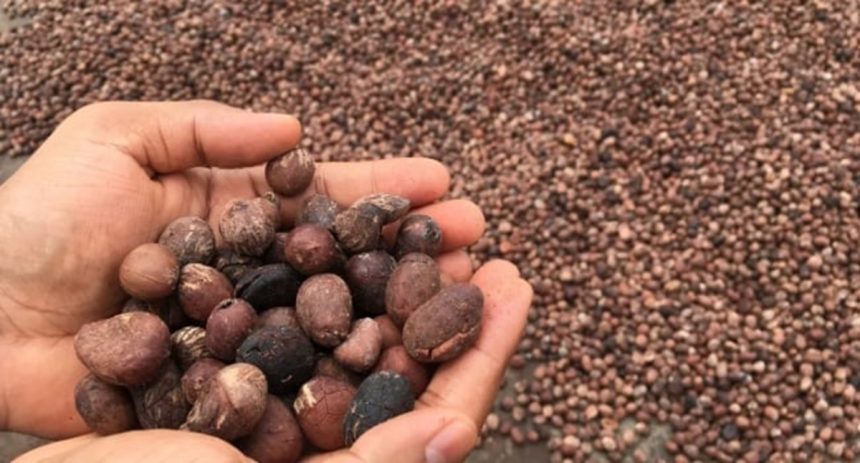•It is a timely intervention —Tinubu
IN a landmark move to industrialise Nigeria’s agricultural sector and capture greater value from its natural resources, His Excellency President Bola Ahmed Tinubu has approved a six-month temporary ban on the export of raw shea nuts (Vitellaria paradoxa).
The directive, which took immediate effect, was conveyed through the Office of the Vice-President, Kashim Shettima, stated, “We are not closing doors, we are opening better ones. Today we plant the seeds of an industry that will yield fruit for decades to come; for our women, for our economy, and for Nigeria’s place in global trade.”
The decision followed a rapid assessment by the Presidential Food Systems Coordinating Unit (PFSCU). The assessment revealed that despite producing nearly 40 per cent of the world’s shea nuts; an estimated 350,000 metric tonnes annually, Nigeria captures less than 1 per cent of the global shea market, valued at $6.5 billion.
This strategic policy was designed to protect and grow Nigeria’s domestic shea industry by halting the annual loss of over 90,000 metric tonnes of raw shea to informal cross-border trade. The ban will secure raw materials for local processors, who currently operate at only 35-50 per cent capacity—boost jobs and incomes in rural communities, and protect a value chain where 95 per cent of pickers and processors are women.
The decision positions Nigeria alongside regional leaders in shea production, including Ghana, Togo, Mali, and Burkina Faso, which have already implemented similar restrictions to develop their local processing industries and retain value within their economies.
Eniola Akindele, Data and Impact Assessment Manager of the Presidential Food Systems Coordinating Unit (PFSCU), underscored the untapped potential in the Shea value chain ‘’Shea has the potential to become Nigeria’s untapped goldmine. Beyond its well-known use in cosmetics, shea is increasingly in demand as a substitute for cocoa in global chocolate and confectionery industries. With the right processing capacity and investment platforms, Nigeria can transform its currently underutilised shea value chain into a billion-dollar industry, one that creates jobs, empowers women, and significantly boosts our foreign exchange earnings.”
Key agricultural stakeholders have hailed the presidential directive as a transformative game-changer for the Nigerian economy.
ALSO READ: FG, El-Rufai clash over payment of ransom to bandits
Architect Kabir Ibrahim, National President of the Nigeria Agribusiness Group (NABG) and the All-Farmers Association of Nigeria (AFAN), stated: “This is a pivotal moment for Nigeria’s agricultural industrialisation. For decades, we have exported raw shea nuts only to import the finished products at a much higher cost. This policy corrects that imbalance. It is a strategic imperative that will stimulate investment in local processing facilities, create thousands of jobs for our youth and women in rural communities, and significantly increase our national export earnings from a commodity we are blessed with in abundance. We commend His Excellency, President Tinubu, for this bold and visionary action, and we hope that this initiative is extended to other value chains as well.”
Across the West African corridor, value addition for shea nut has been a big topic. “Regional neighbours such as Ghana, Burkina Faso, Mali, and Togo have already imposed restrictions to protect their industries, leaving Nigeria as the outlier and a hotspot for opportunistic and unregulated buying” says the Minister for Agriculture and Food Security, Abubakar Kyari.
Another stakeholder, who craved anonymity, emphasized the broader regional significance: “The synchronized action across West Africa is a powerful signal to the global market. Nigeria should not just be suppliers of raw materials; the country should be manufacturers and exporters of finished goods. This collective stance by shea-producing nations will give Africa much needed stronger negotiating power and ensure that the wealth generated from its natural resources benefits its people, communities and economies.”
After a very long time, it appears West African nations are taking a united and collective stand to ensure their resources are managed well for the betterment of the region.
Many of the stakeholders who expressed enthusiasm for the ban are hopeful that this is the beginning of a new trend where value addition is domesticated in Africa, thereby reversing the historic trend of exporting raw materials and importing processed goods.
Others, despite commending the administration’s commitment to value addition, have urged the Government to give more clarity as to the implementation and enforcement of the new policy, to prevent smuggling and other risks.
On the other hand, the government has announced that within the next three months, Nigerian shea butter and oil will have prioritised access into the Brazilian market; an opportunity, if well leveraged, that can bring huge gains to the industry.
Also, wife of the President of the Federal Republic of Nigeria, Senator Oluremi Tinubu, has described the ban on the exportation of raw shea butter as a timely intervention that will empower local processors and unlock new opportunities in Nigeria’s agricultural value chain.
The first lady gave the commendation at the closing of a three-day National Workshop on Agro-Value-Chain Capacity Building for Women Farmers, held on Saturday in Abuja.
Represented by Hajiya Nana Shettima, Wife of the Vice-President, the First Lady said the directive marked a significant milestone for women in the agro-processing sector.
According to her, women account for over 95 per cent of small-scale shea butter processors across the country.
She noted that the new policy would not only reduce the exploitation of raw products but also promote domestic value addition.
“This decision underscores the Federal Government’s commitment to boosting local agro-processing capacity.
“By retaining production within our borders, we are empowering women to scale their businesses, improve household incomes, and contribute to national food security,” she said.
Delivering her remarks at the event, the Minister of Women Affairs, Hajiya Imaan Suleiman-Ibrahim, said the workshop represented a turning point for Nigerian women in agriculture.
She emphasised that women remain the backbone of the sector, even though they are often excluded from critical resources.
“Over the past days, we have sharpened knowledge, built capacity, and deepened partnerships.
“But more importantly, we have reaffirmed an undeniable truth: Nigeria’s agricultural transformation will rise or fall on the shoulders of women,” she said.
The minister pointed out the paradox of Nigeria’s agriculture, where women form nearly 70 per cent of the workforce but remain under-represented in land ownership, credit access, mechanisation, and leadership roles.
She stressed that giving women equal access to resources could increase yields by 20–30 per cent, enough to feed millions more Nigerians.
Unveiling the Women Agro Value Expansion (WAVE) Programme, Suleiman-Ibrahim said the initiative aims to reach 10 million women nationwide.
“With the right support, our women will not only feed the nation, they will feed Africa,” she declared.
She added that under the Renewed Hope Agenda, three strong commitments had been made: dismantling systemic barriers that limit women’s potential, moving women from subsistence to prosperity, and institutionalising gender equity in agricultural policies and programmes.
Some participants at the workshop praised the initiative, describing it as life-changing.
Afiniki Bubmba, who represented the Country Women Association Network (KANET), said:
“The practical sessions, especially on greenhouse construction and crop sequencing, have sparked my interest to begin a mini-greenhouse project at home.”
She encouraged other women to embrace agriculture and shed the stereotype of farming as “dirty work.”
Another participant, Aisha Burka, also from KANET, commended the training, describing the knowledge gained as invaluable.
“Agriculture is not only a tool for food production but also a platform for leadership, wealth creation, and national transformation,” she said.
Burka added that she was determined to mobilise between 100 and 200 women to benefit from the knowledge she had acquired.
She urged them to start small even within their backyards because farming was both economically rewarding and essential for food security.
WATCH TOP VIDEOS FROM NIGERIAN TRIBUNE TV
- Let’s Talk About SELF-AWARENESS
- Is Your Confidence Mistaken for Pride? Let’s talk about it
- Is Etiquette About Perfection…Or Just Not Being Rude?
- Top Psychologist Reveal 3 Signs You’re Struggling With Imposter Syndrome
- Do You Pick Up Work-Related Calls at Midnight or Never? Let’s Talk About Boundaries






